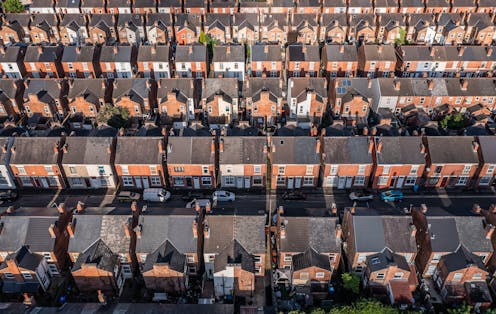UK interest rates cut – here’s the outlook for property owners and home buyers after the budget
- Written by Alper Kara, Professor of Banking and Finance, Brunel University of London

The main thrusts[1] of the UK government’s budget[2] in October 2024 was more borrowing, more tax and more spending. And within those broad goals lie substantial implications for the housing market.
One of the immediate impacts is the budget’s effect on mortgage rates[3] from the planned increase in government borrowing, which has been estimated at £70 billion[4] to fund infrastructure and social initiatives.
Increased borrowing by the government often leads to higher bond yields[5] – the rate of interest the government has to pay to investors – as it competes for funds in the financial markets. This in turn increases the cost of borrowing across the economy, which means lenders may raise mortgage rates.
The Office for Budget Responsibility (OBR) now projects that average mortgage rates may increase from 3.7% to 4.5% over the next three years[6] as a result.
And the Bank of England may need to respond in a similar way. For while the Bank has still gone ahead with the expected November 0.25% interest rate cut[7] to 4.75%, it also warned[8] about the uncertainty around the degree of inflationary pressure and wage growth.
The Bank raised its post-budget inflation forecast[9] and signalled that it will be more cautious about anticipated interest rate cuts. If the inflationary pressure turns out to be more than expected, the Bank could even decide to increase rates.
The market has already shown signs of such expectations[10]. Major lenders have also warned[11] that mortgage costs could remain elevated for longer following the budget, immediately effecting mortgage affordability and household budgets.
Buy-to-live
The budget also included policies targeting the housing supply and landlords, which are likely to affect the property sector.
The government had already promised to build 1.5 million homes over the course of this parliament in their pre-election manifesto. And an increase in housing supply could slow down the recent relentless increase[12] in UK house prices.
To achieve these ambitious targets, the budget introduced several measures. One of these is an additional £5 billion to expand the affordable homes programme, which includes support[13] to build up to 5,000 extra homes next year.
An additional £3 billion will also be provided to the private housing sector by expanding existing housing guarantee schemes[14]. These provide government loan guarantees to support the construction of affordable homes by reducing borrowing costs for housing associations and developers.
Chancellor Rachel Reeves also chose to maintain the current capital gains tax rates on residential properties, a policy welcomed by landlords[15]. An increase could have triggered a sell off of buy-to-let properties, potentially reducing some house prices.
But the stamp duty surcharge on the purchase of second properties was raised from 3% to 5%, to slow down[16] the demand in investment properties.
Additionally, the government has not committed to extending the current lower stamp duty thresholds, which are set to increase[17] after March 2025. As a result, homebuyers – particularly first-time buyers – will face higher purchase costs.
One positive development for first-time buyers is the government’s plan to make mortgage guarantee scheme permanently available, supporting people to buy with deposits of just 5% of the property price[18]. This move will end the scheme’s intermittent availability and offer greater certainty for the first-time buyers preparing to enter the housing market.
Borrowing: an expensive business
Ultimately, accurate prediction of house price growth is challenging, as it also depends on changing factors like wage growth and mortgage rates. But current projections[19] suggest that price growth will slow from 1.7% in 2024 to 1.1% in 2025, followed by annual increases of 2.5% through to 2030.
It is also important to remember that these predictions vary by region. Local planning laws, policies, and land availability also significantly influence house price dynamics.
Wage growth is crucial in shaping mortgage affordability and housing prices. As wages rise, people gain purchasing power, making higher mortgage payments more manageable. However, this increased affordability can also contribute to rising property prices.
If wage growth stagnates or fails to keep pace with rising living costs, mortgage affordability diminishes. Critics[21] have argued that increased national insurance contributions in the new budget may lead to such stagnation.
What’s more, while the budget measures are expected to boost growth for 2024, the size of the UK economy will remain largely unchanged over the next five years[22].
Despite government initiatives to improve housing affordability and offer support for first-time buyers, rising borrowing costs and inflation pressures are likely to affect mortgage affordability. Combined with stagnant wage growth, these factors suggest that home ownership will remain a challenging goal for many in the foreseeable future.
References
- ^ main thrusts (theconversation.com)
- ^ budget (www.gov.uk)
- ^ effect on mortgage rates (www.msn.com)
- ^ £70 billion (obr.uk)
- ^ higher bond yields (www.hbs.edu)
- ^ over the next three years (obr.uk)
- ^ 0.25% interest rate cut (www.bbc.co.uk)
- ^ warned (www.bankofengland.co.uk)
- ^ inflation forecast (www.ft.com)
- ^ signs of such expectations (www.reuters.com)
- ^ have also warned (www.bbc.co.uk)
- ^ recent relentless increase (www.propertyinvestmentproject.co.uk)
- ^ support (www.gov.uk)
- ^ housing guarantee schemes (www.gov.uk)
- ^ welcomed by landlords (www.mortgagesolutions.co.uk)
- ^ slow down (onlinelibrary.wiley.com)
- ^ set to increase (www.standard.co.uk)
- ^ 5% of the property price (assets.publishing.service.gov.uk)
- ^ current projections (obr.uk)
- ^ I R Stone/Shutterstock (www.shutterstock.com)
- ^ Critics (www.niesr.ac.uk)
- ^ next five years (www.bbc.co.uk)







